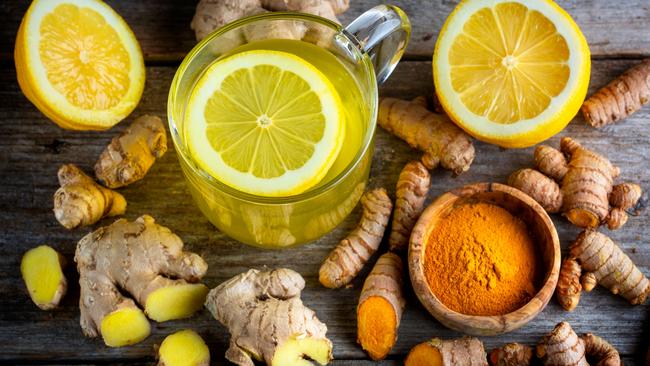Reboot your immunity! What really works?
Four out of ten of us have bought a food or drink in the hope that it will prevent illness - but is there any science behind popular ‘boosters’?

Four out of ten of us have bought a food or drink in the hope that it will prevent illness - but is there any science behind popular ‘boosters’?
Did you reach for a mega-dose vitamin C this morning? Or perhaps you had a turmeric shot to boost your defences? The market for products claiming to protect us against illness seems to grow exponentially, and supermarket shelves are weighed down with such items, from “immune breakfast boost” seeds to scatter on your cereal to “immunity boosting power soup”. There’s even an “Immunity” blend tea bag with added vitamin C in the PG Tips Plus range and a “smart loaf” from Modern Baker that “supports normal immune function”.
Last year a joint survey by Grocer magazine and Harris Interactive found that four out of ten of us had bought some form of food and drink to help our immune responses in the previous year. But does any of it really work?
Jenna Macciochi, a senior lecturer in immunology at the University of Sussex and author of Your Blueprint for Strong Immunity, says the idea that we can eat our way to immunity is flawed. “It is scientifically and medically incorrect to say that we can strengthen our immunity by increasing our short-term consumption of certain foods or nutrients.” Besides, Macciochi says, “Because of the way the immune system is designed to work, you definitely wouldn’t want it being boosted. What people often don’t realise is that there are two arms to the immune system - the innate part that patrols and responds to an invader, such as a cold virus, and the adaptive part that uses T-cells and white blood cells to kill these invaders and aid the healing process.
“If we have too much of one arm of the immune system boosted it can cause illness and even serious autoimmune problems when the other arm produces too strong a response. What we are after is a balanced immune system that functions well so that regulatory immune cells keep highly reactive cells in check.”
Fever, swelling, pain and fatigue are often considered a sign of malfunctioning immunity and yet these symptoms of inflammation are signs that your immune system is doing its job.
“This contained and short-lived inflammation is your immune system’s response to germs and disease, a way of responding to things that cause harm. It’s a very sophisticated and highly orchestrated process, involving many cells and molecules, that works hard to keep us well and is an essential part of the body’s defence mechanism.”
Maintaining the delicate balance of this complex system is not as simple as sipping an immune-boosting smoothie or popping a pill. “We all want the best possible immune fitness,” Macciochi says, “but unfortunately immune enhancement is inappropriately used by manufacturers as a marketing tool.”
When Canadian researchers investigated the validity of posts with the hashtag #immunebooster on Instagram they found many to be “devoid of sound science” and generally promoting “misleading information about immunity and advanced products and services of no proven immunological benefit”. Overstating the purported benefits of “immune enhancing” ingredients has also raised the hackles of the Advertising Standards Authority, which issued advice underlining the health claims relating to immune function that can and cannot be emblazoned on packaging.
While immunity claims can be made on products that contain vitamins B12 and C, selenium and iron, the ASA advises manufacturers not to suggest that these ingredients are responsible for “boosting, strengthening, stimulating or optimising immune function”. In short, no product should claim that it “contributes to, helps or supports” immune defences, only, where appropriate, saying that it might “contribute to the normal function of the immune system”.
None of this means that diet doesn’t matter in the fight against virus and disease, but rather that you need to commit for the long haul. “Improving the basics is where to start,” says Macciochi. “Our immune systems require adequate levels of all vitamins and minerals for day-to-day functioning and it follows that having any nutrient deficiency will leave immunity compromised.”
If you do fall ill, some nutrients are used up faster than others, which is when taking extra might sometimes be useful. Just don’t expect to bounce out of bed immediately. “The notion that the immune system is some kind of internal force field that can be magically boosted by eating a certain ingredient or nutrient is rooted in misunderstood science. A balanced immune system requires a balanced diet.”
So what steps should or shouldn’t you take to keep your immune system in shape?
Vitamin D supplements
Verdict: Take at least 10mcg daily during winter
Public Health England recommends that everyone should supplement with 10 micrograms a day of vitamin D during the winter months (October-March) and those with darker skin, the elderly and those who spend a lot of time inside and are at greater risk of deficiency are advised to supplement all year round. Vitamin D gained naturally from sunshine between April and September is stored in the body, “but by the time January comes you will probably run short”, Macciochi says. “Vitamin D is a hormone and acts directly on our immune cells to shape their function. Most people will benefit from taking a supplement, and I would recommend upwards of 10mcg but not more than 100mcg daily - taking short term mega-doses won’t work.” You will also get vitamin D from oily fish, eggs, butter and fortified foods.
Vitamin C supplements
Verdict: Consider taking extra only if you are stressed (or a triathlete)
If you get your five a day, you will be getting sufficient vitamin C to support your defences. “A deficiency can lead to a higher susceptibility of catching colds, but for most people supplementing with high doses does not reduce the risk,” Macciochi says. If you do catch a cold, taking 1-2g of vitamin C per day might reduce the severity of symptoms and their duration. “It has stronger effects in people who are under intense physical stress,” she says. “A study in marathon runners and cross-country skiers suggested that vitamin C supplementation halved the duration of a typical cold.” (While we're on vitamins - read the latest from Peta Bee on Vitamin B)
Turmeric
Verdict: Add to cooking, but don’t bother with shots
This bright yellow spice has antiviral and antibacterial properties, although claims that it is a cure-all for immunity are overblown, and “short-term dosing up on turmeric shots and supplements for immediate results won’t work”, Macciochi says. Much of the attention focuses on curcumin, one of the more than 300 active ingredients in turmeric, and a 2020 study suggested that curcumin could help eliminate certain viruses. Macciochi recommends adding it regularly to meals to support immunity. “Ideally pair it with a little oil and dash of black pepper, which can boost absorption in the body by 2,000 per cent,” she says.
Probiotics
Verdict: Some strains might be helpful (but there’s no guarantee)
Maintaining a healthy gut with a balanced diet that includes a wide variety of fruit and vegetables with plenty of fibre is certainly helpful in the fight against infection. But will popping extra beneficial bacteria in the form of a probiotic supplement provide further protection?
“Probiotics work in strain-specific ways and we are all different, so what works in a petri dish might not work for you,” Macciochi says. Some probiotic strains that have been shown to help reduce the likelihood of catching colds and flu and to reduce the duration and severity of infection include Lactobacillus rhamnosus GG, Bifidobacterium lactis BB12 and Lactobacillus paracasei CASEI 431. “But even when there is supporting science, it doesn’t guarantee that they will work, and you would need to take them consistently,” Macciochi says. “Eating a plethora of plant foods along with fermented foods and drinks such as kimchi, kefir and kombucha is a better safety net.”
Echinacea
Verdict: Not worth taking
Echinacea may be the darling of the winter wellness brigade, but despite several large studies investigating its effectiveness in treating or preventing colds, Macciochi says that “the jury is still out on whether it works”. There are different species of the echinacea plant and different parts of the plant are supposed to have different properties. “It might interact negatively with other medications you are taking too,” she says.
Lemon, honey and ginger
Verdict: Soothing but won’t support immunity
Your mother may have presented you with a mug of hot lemon, honey and ginger as an immune-boosting cold cure, but there is no scientific evidence that it works. “If you have a cold already, it will soothe your throat and hydrate you, which are important in making you feel better,” Macciochi says. “But it won’t prevent or ease infection.” Honey on its own is an effective cough suppressant, particularly for children. “The NHS recommends honey first, not antibiotics, for treatment of coughs,” Macciochi says. “But none of these ingredients will support immunity.”
Garlic
Verdict: Add an extra clove of grated garlic to meals
Chemical compounds in garlic such as allicin have antimicrobial activity and there is some evidence that regularly consuming it in the diet is helpful in the treatment and prevention of upper respiratory viruses. In one study, supported by the US National Cancer Institute, a single meal containing one clove of raw crushed garlic helped to activate multiple genes related to immune function. “The way garlic is prepared can really change its powers,” Macciochi says. “It’s estimated that we need three times as much cooked garlic as raw because some of the plant compounds reduce with cooking.” To optimise the benefits with each clove, she suggests chopping, grating or crushing a clove and leaving it to sit for several minutes “to allow enzyme conversion of allicin”. Add raw to dips or salad dressings or add an extra clove to cooked dishes. (Read this from Peta Bee: Raw or cooked? The best way to eat vegetables)
Zinc
Verdict: Get it from food and consider a small-dose supplement if over 60
Zinc is critical for the development and function of immune cells and, because it is not stored in the body, you need a regular supply from food with good sources including meat, poultry, shellfish, nuts and seeds. “Supplements are unlikely to reduce your chances of infection unless you have a zinc deficiency,” Macciochi says. “Our ability to absorb zinc does decline with age, so the over-60s might need to correct a shortfall.” It’s also useful if you do catch a cold because short-term small doses of 10-40mg of zinc supplements or lozenges taken over a few days have been shown to reduce the duration of the virus. “Long-term high doses can cause GI upset and interfere with copper and iron absorption by the body,” she says. “If you do take a low-dose supplement, also take the flavonoid quercetin, which will help zinc to get inside your cells.”
Selenium
Verdict: Don’t take a supplement
Selenium is another micronutrient involved in many of the body’s biological processes including immune function. It is found in bread, meat, poultry, fish, tofu, eggs, brazil nuts and milk. “Unless you have a confirmed deficiency, taking more selenium in supplement form is not always better,” Macciochi says. “Studies have shown that too much could drive unruly inflammatory responses in the body, upsetting the delicate balance of immune function.”
Chicken soup
Verdict: Worth taking if you feel rough
It won’t enhance your immune system, but it is a highly effective feel-good food if you are feeling poorly. “A number of substances in chicken soup make it comforting,” Macciochi says. “It contains carnosine, which will support immune cells, vitamins and nutrients that slow the growth of mucus-stimulating neutrophils and ease the airways.” It will also keep you hydrated. “Even if it is just the placebo effect, you will probably feel better after eating chicken soup.”


